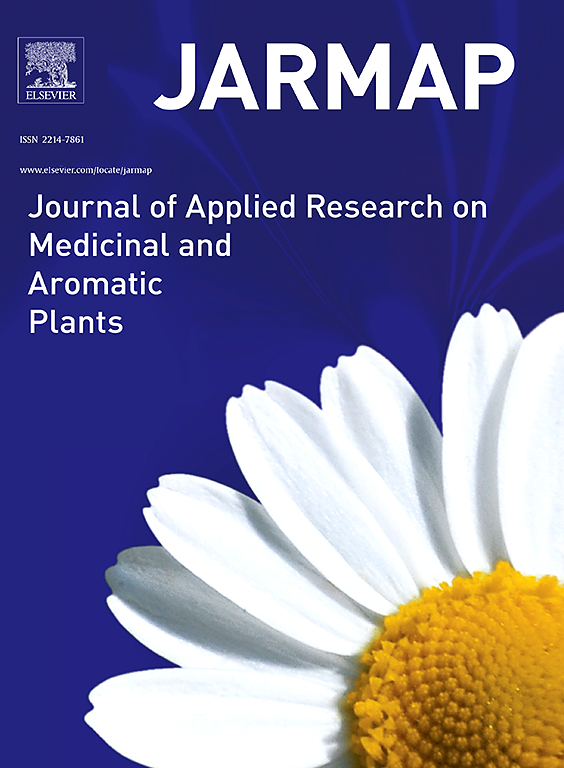Development and validation of a method for the simultaneous estimation of terpinene-4-ol and 1,8-cineole in Melaleuca alternifolia (Maiden & Betche) Cheel and Rosmarinus officinalis L. oil using HPTLC coupled with a QbD approach
IF 3.6
2区 农林科学
Q1 PLANT SCIENCES
Journal of Applied Research on Medicinal and Aromatic Plants
Pub Date : 2024-09-25
DOI:10.1016/j.jarmap.2024.100584
引用次数: 0
Abstract
This paper comprehends a Quality by design (QbD) approach for development of a simple and precise HPTLC (High performance thin layer chromatography) method for simultaneous estimation of the phytoconstituents terpinen-4-ol and 1,8-cineole found in Melaleuca alternifolia (tea tree oil) and Rosmarinus officinalis (rosemary oil) respectively. The method was optimized by Design expert software using response surface methodology. The chromatographic condition optimized by using software was, mobile phase as hexane: ethyl acetate: glacial acetic acid in the ratio of 8.5:1.5:0.47 % v/v, stationary phase as TLC plates precoated with silica gel 60 F254 at ambient temperature conditions and saturation time 20 min at 366 nm. Optimized conditions were verified and validated as per ICH Q2 (R1) (International council for harmonization of technical requirements of pharmaceuticals for human use) guidelines. The method developed was validated for the parameters such as specificity, linearity, DL, QL, accuracy and precision. This method was then applied for simultaneous estimation of terpinen-4-ol and 1,8-cineole in Melaleuca alternifolia (tea Tree oil) and Rosmarinus officinalis (rosemary oil) respectively.
利用 HPTLC 和 QbD 方法开发并验证同时估算 Melaleuca alternifolia (Maiden & Betche) Cheel 和 Rosmarinus officinalis L. 油中 terpinene-4-ol 和 1,8-cineole 的方法
本文采用质量源于设计(QbD)的方法,开发了一种简单而精确的 HPTLC(高效薄层色谱法)方法,用于同时估算互生白千层(茶树油)和迷迭香(迷迭香油)中分别含有的植物成分 terpinen-4-ol 和 1,8-cineole。采用响应面方法,通过 Design expert 软件对该方法进行了优化。使用软件优化的色谱条件为:流动相为正己烷:乙酸乙酯:冰醋酸,比例为 8.5:1.5:0.47 % v/v;固定相为预涂硅胶 60 F254 的 TLC 板,条件为常温;饱和时间为 20 分钟,波长为 366 nm。根据 ICH Q2 (R1)(国际人用药品技术要求协调理事会)指南对优化条件进行了验证和确认。对所开发的方法进行了特异性、线性、DL、QL、准确度和精密度等参数的验证。然后将该方法分别用于同时测定互生白千层(茶树油)和迷迭香(迷迭香油)中的萜品烯-4-醇和 1,8-蒎烯。
本文章由计算机程序翻译,如有差异,请以英文原文为准。
求助全文
约1分钟内获得全文
求助全文
来源期刊

Journal of Applied Research on Medicinal and Aromatic Plants
Pharmacology, Toxicology and Pharmaceutics-Drug Discovery
CiteScore
6.40
自引率
7.70%
发文量
80
审稿时长
41 days
期刊介绍:
JARMAP is a peer reviewed and multidisciplinary communication platform, covering all aspects of the raw material supply chain of medicinal and aromatic plants. JARMAP aims to improve production of tailor made commodities by addressing the various requirements of manufacturers of herbal medicines, herbal teas, seasoning herbs, food and feed supplements and cosmetics. JARMAP covers research on genetic resources, breeding, wild-collection, domestication, propagation, cultivation, phytopathology and plant protection, mechanization, conservation, processing, quality assurance, analytics and economics. JARMAP publishes reviews, original research articles and short communications related to research.
 求助内容:
求助内容: 应助结果提醒方式:
应助结果提醒方式:


